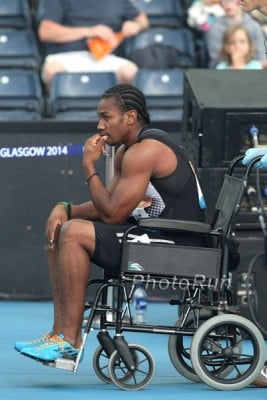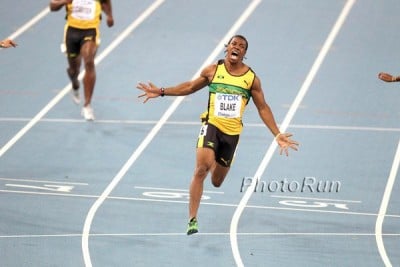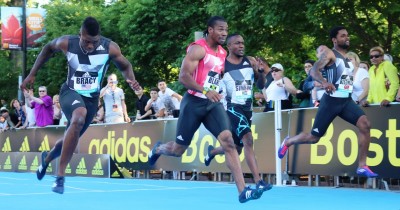The Rebirth Of Yohan Blake
By Jonathan Gault
June 22, 2016
Yohan Blake can point out exactly when everything changed. It was July 11, 2014, Hampden Park in Glasgow, Scotland. Blake was halfway down the homestretch in the men’s 100 when he planted his left foot onto the reddish-brown track. Immediately, he knew something was wrong. Blake slowed, his massive arms flailing for balance, and leaned back as if trying to prevent himself from falling off a cliff. After nine steps, he toppled forward and fell to the ground. Though he picked himself up quickly, Blake was so stiff that even walking was a problem; he eventually had to be carted off the track in a wheelchair (video of injury here). He would not race again for 11 months.
There’s still an air of frustration in Blake’s voice as he recounts the incident nearly two years later, while using a cricket ball (his first love) to roll out the hamstring before a photo shoot last week at Dilboy Stadium in Somerville, Mass. Despite missing the World Championships in 2013 with a right hamstring injury and a slow start to his Diamond League season in 2014, Blake says that there were no warning signs before that day in Glasgow that something was going to go wrong.
“I didn’t feel like it was a problem,” Blake says. “It just happened. It’s not like I was feeling any niggle or anything. It was just I was just in Glasgow and I was running and I just felt it and it come off the bone.”
Unlike the right hamstring issue that had kept him out of Worlds in 2013, this injury — a tear in his left hamstring — required surgery, which Blake underwent a few days later in Luxembourg. It cost Blake the rest of his 2014 season and though he returned last year, he was a shell of the sprinter who became the youngest man in history to claim the 100-meter world title in 2011 and earned Olympic silvers in the 100 and 200 (plus a gold in the 4×100 relay) in 2012. Blake didn’t even make the final at the Jamaican Championships, running 10.36 to place sixth in his semi. His season best of 10.12 ranked him tied for 71st in the world, hardly inspiring for a man who owns the second-fastest times in history for both 100 (9.69) and 200 meters (19.26).
Time To Hang ‘Em Up?
Blake says the lowest point came for him last July at a meet in Lucerne, Switzerland. His Jamaican countryman Asafa Powell, Nesta Carter and Kemar Bailey-Cole — men Blake would trounce in his prime — went 1-2-3 in the top heat. Blake was relegated to section 2 and couldn’t even win that, running 10.20 to finish behind Turkey’s Jak Ali Harvey.
“I said ‘Damn, is this what I’m going to?'” Blake says. “I came second in the race struggling and I was really thinking to myself, ‘Oh my god Blake, it’s going to be tough for you.’”
Blake, still only 25 years old at the time (now 26), was considering hanging up his spikes.
“We’re humans,” Blake says. “I have those moments. I said ‘Boy, I wonder if…’ And I said to myself, ‘Listen, you are better than that. Just go back out there.'”
***
The sun is bright and relentless as it beats down on the track in Somerville, a light breeze the only relief, but the 5’11” Blake, a native of Bogue Hill near Montego Bay, is used to this sort of weather. He’s bundled up head-to-toe in adidas gear, a dark gray tee and light blue undershirt concealing his massive shoulders and comic-book abs, dark gray shorts extending past his kneecaps over black tights. It’s all rather business-like for Blake. As he and Olympic 200-meter bronze medallist Warren Weir run through warmup drills on the backstretch, Weir is the one doing all the talking, telling stories or cracking jokes as Blake is content to mostly listen and nod. For a moment, you wonder how the soft-spoken Blake fits in with the garrulous Weir and gregarious Usain Bolt, his training partners at Racers Track Club in Kingston. Then you spot his socks: teal with a hamburgers pattern on one foot, royal blue with bulldogs on the other.
Laughs are common at Racers practices, but when Blake returned after the surgery last year, it was a grind. Doctors told him that it would take him two years to fully recover, and for someone who dedicates his life to getting to the finish line as fast as possible, taking it slow was difficult.
“Yohan is his own worst enemy,” says his agent, Cubie Seegobin. “He works too hard.”
Blake had to restrain himself. If he came back too hard too soon, he risked reaggravating the injury. So he took two months off following the surgery, and then began working daily with his sports massage therapist, Shaun Kettle, to get back to full health. Blake competed last season, but in seven 100-meter races, he broke 10.20 just once.
“Last year wasn’t the old me,” Blake says. “At least I was doing some running, which was important.”
Now, with another offseason of work, Seegobin says Blake’s hamstring is stronger than ever. And while the doctors told him the injury has fully healed, the mental wounds take longer to close up.
“Mentally was the toughest part,” Blake says. “Because physically you’re okay and mentally you’re not. You’re running with doubt, knowing something can happen. Every race that I ran, I said to myself that I used to be ready to lift [my legs] and not [be] worried. It took a while before I got that feeling away.”
Blake’s hesitation was clear to those around him. During one session early last year, his coach, Glen Mills, confronted Blake.
“Coach said to me, ‘You know if you’re going to run like that, you’re not going to compete like you used to. You have to go out there and if you’re going to injure, you’re going to injure. You can’t think of it. Anything that’s supposed to happen, will happen. Just go out there and run.'”
So Blake took to rebuilding his race, piece by piece. At first, he feared testing his hamstring in block starts, but he overcame that fear through hours of repetition. He proceeded cautiously and gradually began to trust his body more and more as he started to show flashes of his old form. Blake ran 21.33 in his first 200 this year on April 2, but that time is deceiving; it came into a massive 4.2 m/s headwind. He finished just .10 behind Weir, one of the world’s top 200 men in recent years.
End of “The Beast”
Two weeks later, he was set to run a 100 in Kingston, when he received a message from pastor Andrew Scott. Blake, a deeply religious man, said that God told him, through Scott, that he had to get rid of “The Beast” nickname, bestowed on him by Bolt for his fierce work ethic. Scott promised that if Blake gave it up, he would run fast within 72 hours. Lo and behold, three days later he ran 9.95, his first sub-10 clocking in almost four years and the #1 time in the world at the time. A new Yohan Blake was born.
“The nickname was holding me back,” Blake said. “I keep on getting injured and it was related to the beasts in the Bible…God didn’t like it, so I had to change it.”
Blake has returned to the upper echelon of global sprinting, but work remains to be done. On June 11 in Kingston, Blake faced Bolt over 100 meters for the first time since the 2012 Olympics. Bolt got out to a horrible start but recovered and destroyed Blake over the final 40 meters, winning in 9.88 (Blake was third in 9.94, his best time since 2012).
https://youtu.be/ZorEj7NBCmY?t=40s
“When he got to that point where he [used to] pull away from the crowd, he started to tighten up because he doesn’t remember how to manage that speed,” Kettle says. “But once he gets into a few more races and stuff like that and his body can adapt back to that speed [he’ll be better]…because he’s stronger now than he was before.”
NBC sprint analyst Ato Boldon, four-time Olympic medallist, agrees with Kettle’s assessment.
“He’s not as explosive,” Boldon says. “The middle of his race used to be phenomenal and it’s not there yet. He’s not explosive, his turnover is not quite there and his stride length is not quite there…I just think he needs more races. He hasn’t had many really high-quality races. I think that’s why you see him making an effort to run more races. Clearly he feels like the more he races, the better he feels and I tend to agree with that.”
Indeed, Blake admits that one of the biggest things he needs to work on over the next two months is muscle memory. When he gets to the final 40 meters of the Olympic 100 final on the night of August 14, he can’t be thinking through every step: his body has to know what to do on its own.
***
As Kettle works through his Blake’s legs on a massage table laid out in lane 6, Blake reminisces about his glory days — the world title in 2011, the shocking 19.26 in Brussels three weeks later, the Olympic medals in 2012. He doesn’t want that to be all he is remembered for.
“I believe in myself and know I can get back even faster. I know I’m going to get back even faster. I just need to put myself together. Right now I’m rusty.”
Both Blake and Kettle point to Blake’s early-season times as evidence of his return; Blake even says that he thinks he’s ahead of where he was in 2012. But the results don’t back that up. Blake opened up in 9.90 in 2012 and by this point in the season, he had run 9.84, 9.90 and 9.90. In ’16, he opened up in 9.95 and his best three times are 9.94, 9.95 and 10.03.
Most recently, at the adidas Boost Boston Games on Saturday, Blake ran 10.23 in the 100 on a temporary track erected on Boston Common, losing to American Marvin Bracy by two-thousandths of a second. Blake later said that his form was all over the place, largely due to the bounciness of the track, which he called “atrocious.” Afterward, fans and volunteers pestered him for selfies. Blake politely obliged, but it took all of his effort not to ruin the photos, his face barely obscuring his disappointment as he formed half-hearted #1 gestures with his index finger. It was not an ideal result in his final race before Jamaica’s national championships, which begin on June 30 and will determine the Jamaican Olympic team.
Boldon fully expects Blake to be in Rio this summer but thinks challenging Bolt — as Blake did when he beat him in both the 100 and the 200 at the Jamaican trials in 2012 — is a long shot.
“There are not a lot of people who have come back better than they were before from hamstring surgery,” Boldon says. “I don’t know if we’re going to see the Yohan Blake that we saw in 2011 and 2012 ever again. But I don’t think that he needs that this year to be on the podium. I think that he looks good enough given that he’s coming off of that major surgery and I think he has to like his chances.
“I’ve been impressed with his season thus far…The mental part, and letting go of what I call the ‘sprinter emergency brakes,’ where your brain doesn’t want to feel the pain again and your brain doesn’t want to get injured again so you sort of run, as we say in the business, ‘tight’ — I’ve seen him sort of winning that battle and figuring out how to run like the old Yohan.
“I just don’t think he’s going to come back to 9.68. I would bet against that but I knew he’d be back in some way, shape or form in some capacity. He’s not an old sprinter, there’s not a lot of miles on those legs…I think he has 9.8 in him this year.”
Bolt may be untouchable this year, but the race for Olympic silver in the 100 and 200 is wide-open. Justin Gatlin was hurt early in the year and hasn’t been blowing people away like he was in 2015. World indoor champ Trayvon Bromell hasn’t raced since June 2 with an Achilles injury and his health for the Olympic Trials is uncertain. Canada’s Andre De Grasse has won his last two Diamond League races but his SBs (10.07/20.16) don’t scare anyone.
Blake could leave Rio with three more Olympic medals, but he’s got his sights set on a lot more than that. Bolt will be leaving the sport soon — barring a Michael Phelps-esque change of heart, he won’t be back for Tokyo 2020 — and his exit will leave a void.
“[Usain] said I need to take over and I’m going to take over,” Blake says. “We train together so he knows.”
When is Blake going to take over?
“You will see,” he says.
The world is waiting.









